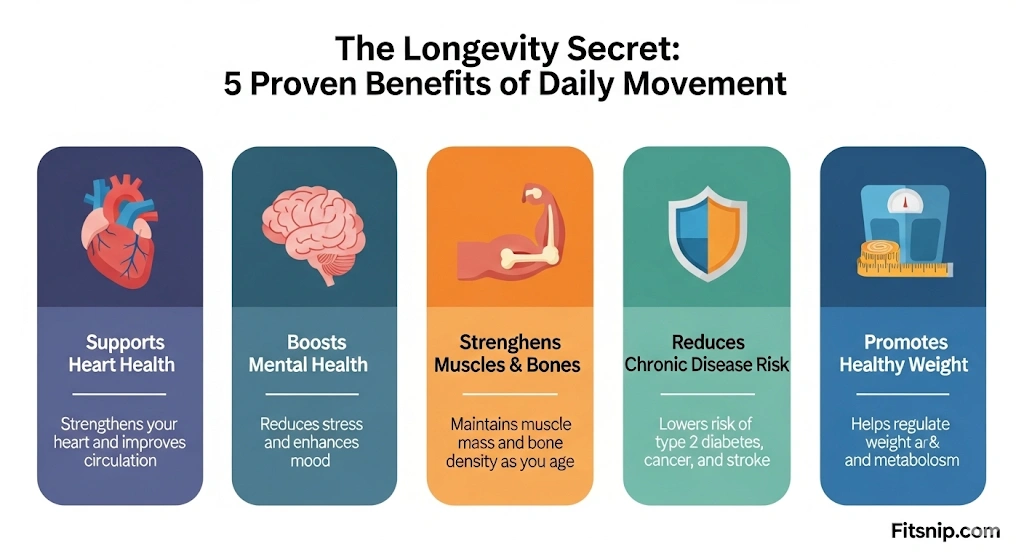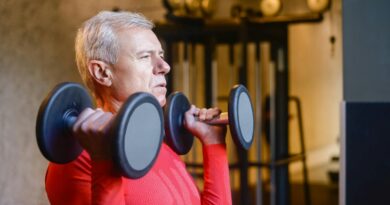The Longevity Secret: How Daily Movement Adds Years to Your Life
Quick Summary
The secret to a longer, healthier life is not found in a gym membership. Daily, natural movement like walking, gardening, and climbing stairs strengthens your heart, reduces chronic disease risk, preserves mobility, and boosts mental health. Research shows that even moderate physical activity adds years to life expectancy and enhances overall quality of life.
Introduction
The world’s longest-living people are not spending hours in the gym. They weave natural exercise into their daily routines, walking to the market, tending gardens, climbing stairs, and carrying groceries. This consistent, low-intensity active lifestyle is one of the strongest predictors of longevity and extended healthspan, and it is available to anyone, anywhere.
According to the World Health Organization (WHO), physical inactivity is a leading cause of death worldwide, contributing to more than 5 million deaths annually (WHO – Physical Activity Fact Sheet).
Key Takeaways
- 7,000 steps per day lowers risk of premature death
- Daily activity reduces risk of type 2 diabetes, stroke, and certain cancers
- Weight-bearing activity helps maintain muscle and bone strength as you age
- Consistent movement improves mental health, mood, and sleep
- Simple activities like walking, gardening, and chores support healthy weight
The 5 Proven Benefits of Daily Movement for a Longer Life
1. Supports Heart Health
Regular consistent movement strengthens the heart muscle, improves circulation, and lowers blood pressure. A 2020 study published in the Journal of the American Heart Association found that people who walk at least 7,000 steps per day have a significantly lower risk of premature death (JAHA Study).
For more guidance on supporting cardiovascular function, see our article on heart-healthy foods.
2. Reduces Chronic Disease Risk
Daily physical activity reduces the risk of type 2 diabetes, stroke, and certain cancers. The WHO notes that physical inactivity is one of the leading risk factors for global mortality.
3. Preserves Muscle and Bone Strength
With age, muscle mass and bone density naturally decline. Weight-bearing activities like walking, gardening, or stair climbing help slow this process, keeping the body strong and mobile well into later life (NIH – Exercise and Aging).
4. Enhances Mental Health
Movement triggers endorphin release and supports better sleep, mood regulation, and cognitive function. Research from Harvard Medical School links regular natural exercise to reduced risk of depression and cognitive decline (Harvard – Exercise and Depression).
5. Encourages Healthy Weight Maintenance
Consistent movement helps regulate appetite and metabolism, lowering the risk of obesity and related conditions. It is one of the simplest ways to maintain a healthy lifestyle without relying on restrictive diets or extreme routines.

How to Integrate Daily Movement Into Your Life
Practical Ideas to Live Longer Through Movement
Adding small, consistent movements into your day builds long-term health. Here are a few simple but powerful ways to begin:
- Walk More: Instead of searching for the closest parking spot, choose one a few rows farther from the entrance. Make it a daily habit to walk for 15 minutes after dinner to aid digestion and boost metabolism.
- Stand and Stretch: Every hour, stand up, roll your shoulders, and stretch your legs. Even two minutes of light movement helps circulation and reduces stiffness from sitting.
- Do Chores With Purpose: Raking leaves, scrubbing floors, or carrying laundry upstairs are all valuable forms of natural exercise. Approach them with energy and see them as opportunities to strengthen your body.
- Active Commuting: If your destination is less than a mile away, try walking or cycling instead of driving. Over time, these short trips add up to significant health gains and promote an active lifestyle.
- Join Social Activities: Whether it’s a dance class, walking club, or group hike, social movement keeps you consistent. The accountability of others makes it easier to stay active while enjoying connection.
FAQ
Q: How much daily movement is enough for longevity benefits?
A: Even 20–30 minutes of moderate activity daily can improve health outcomes. The key is consistency.
Q: Does it have to be intense exercise?
A: No. Natural, low- to moderate-intensity physical activity is highly effective for health and longevity.
Q: Can I still benefit if I start later in life?
A: Yes. Research shows that starting regular activity at any age improves health and increases life expectancy.
Q: Is walking alone enough to help me live longer?
A: Walking is one of the best forms of movement for longevity. Adding variety, like stretching or light strength work, can provide even greater benefits.
Written by J.D. Wilson and fact-checked by the Fitsnip editorial team
Ready to start? Pair movement with nutrition. Read our beginner’s guide to easy plant-based meals for simple ways to fuel a long, healthy life.
For more on lifestyle changes that promote a longer life, check out Habits of the World’s Longest-Living People.
J.D. Wilson is an Integrative Health Specialist, Certified Meditation Teacher, and author of The Comfort Trap: The Quiet Cost of an Unchallenged Life. He founded Fitsnip.com to translate complex research into practical systems for longevity and mental clarity.
About: https://fitsnip.com/about




